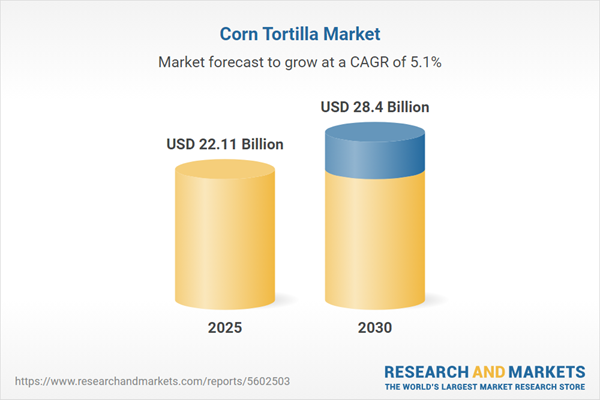Tortilla is a thin, circular flatbread generally made from wheat and cornandpopularly eaten in America and Mexico. Traditionally, it is made up of wheat or corn with dried kernel. Presently, corn tortillas are made from corn cooked in a lime-based solution or by using a dough, forming a pancake, and baking it in theoven. Tortilla has widespread popularity in Mexicana and southwestern cuisine; thus, it has ahuge market in America, Mexico, France, Spain, and Germany.
Based on an average serving size, a flour tortilla is a low-fat food containing iron and other vitamins, with 115 calories. A corn tortilla is also a low-fat, low-sodium food that contains calcium, potassium, and fiberandhas 60 calories. Hence, the growing health awareness among consumers is increasing its market growth. For instance, Tortilla, while native to Mexico, its popularity has grown to the extent that U.S. consumers prefer tortillas above all their ethnic breads, such as bagels, English muffins, and pita bread, as per theTortilla Industry Association.
The global tortilla market consists of producing and supplying wheat and corn tortillas. Along with its production and supply, this market also consists of processing tortillas into tortilla chips, tostadas, taco shells, and other processed forms like frozen tortillas.
Global corn tortilla market drivers
The global popularity of Mexican cuisine is boosting the demand for corn tortillas
Tortilla has been a fundamental part of Mexican and Latin American cuisine. The popularity of Mexican cuisine is rising worldwide. For example, dishes made of tortillas have become popular in Germany in the lastfew decades. According to the Tortilla Industry Association, theUnited States of Americaconsumed around 85 billion tortillas in 2000. Processed tortillas in the form of tortilla chips are widely consumed in theUSA.Hence, the increasing popularity of Mexican foods worldwide has also raised the demand for tortilla wraps in restaurants or tortilla chips, tacos, etc., leading to a surge in growth for theglobal tortilla market.
Global corn tortilla market geographical outlook
North America would be the fastest-growing market for corn tortillas during the forecasted period
Region-wise, the global market is segmented into Asia-Pacific, North America, South America, Europe, Middle East and Africa. North America is the largest market shareholder of tortillas; it would be the fastest-growing market for tortillas, too.This growth in North America in the global tortilla market is a huge consumer base for tortillas in the United States of America and Mexico. According to a report by the Tortilla Industry Association, tortillas are preferred in the USA morethan their native breads. Americans consume more than 85 billion tortillas. 70% of global tortilla sales took place on the American continent, as per Kemin tortilla. Tortillas are now served as substitutes for traditional bread and are used in many recipes, such as hot dogs, lasagna, pitas, sandwiches, etc., in the American mainstream diet.
Reasons for buying this report:
- Insightful Analysis: Gain detailed market insights covering major as well as emerging geographical regions, focusing on customer segments, government policies and socio-economic factors, consumer preferences, industry verticals, other sub-segments.
- Competitive Landscape: Understand the strategic maneuvers employed by key players globally to understand possible market penetration with the correct strategy.
- Market Drivers & Future Trends: Explore the dynamic factors and pivotal market trends and how they will shape up future market developments.
- Actionable Recommendations: Utilize the insights to exercise strategic decision to uncover new business streams and revenues in a dynamic environment.
- Caters to a Wide Audience: Beneficial and cost-effective for startups, research institutions, consultants, SMEs, and large enterprises.
What do businesses use our reports for?
Industry and Market Insights, Opportunity Assessment, Product Demand Forecasting, Market Entry Strategy, Geographical Expansion, Capital Investment Decisions, Regulatory Framework & Implications, New Product Development, Competitive IntelligenceReport Coverage:
- Historical data & forecasts from 2022 to 2030
- Growth Opportunities, Challenges, Supply Chain Outlook, Regulatory Framework, Customer Behaviour, and Trend Analysis
- Competitive Positioning, Strategies, and Market Share Analysis
- Revenue Growth and Forecast Assessment of segments and regions including countries
- Company Profiling (Strategies, Products, Financial Information, and Key Developments among others)
The global corn tortilla market is analyzed into the following segments:
By Type
- White Corn Tortilla
- Yellow Corn Tortilla
By End User
- Retailer
- Restaurants
- Processing Industry
- Others
By Distribution Channel
- Online
- Offline
By Geography
- North America
- South America
- Europe
- Middle East and Africa
- Asia-Pacific
Table of Contents
Companies Mentioned
- La Tortilla Factory Inc.
- Siete Family Foods
- Catallia Mexican Foods
- Komali Tortillas GmbH
- PepsiCo Inc.
- La Mexicana Inc.
- Grupo Bimbo SAB de CV
- The Great Western Tortilla Company
- MexAmerica Foods Inc.
- Vegetas
- Reser’s Fine Foods
- Aranda’s Tortilla Company Inc.
- Adelita’s Tortilla Factory
- Easy Foods Inc.
- Landes Foods
Table Information
| Report Attribute | Details |
|---|---|
| No. of Pages | 124 |
| Published | November 2024 |
| Forecast Period | 2025 - 2030 |
| Estimated Market Value ( USD | $ 22.11 Billion |
| Forecasted Market Value ( USD | $ 28.4 Billion |
| Compound Annual Growth Rate | 5.1% |
| Regions Covered | Global |
| No. of Companies Mentioned | 15 |









